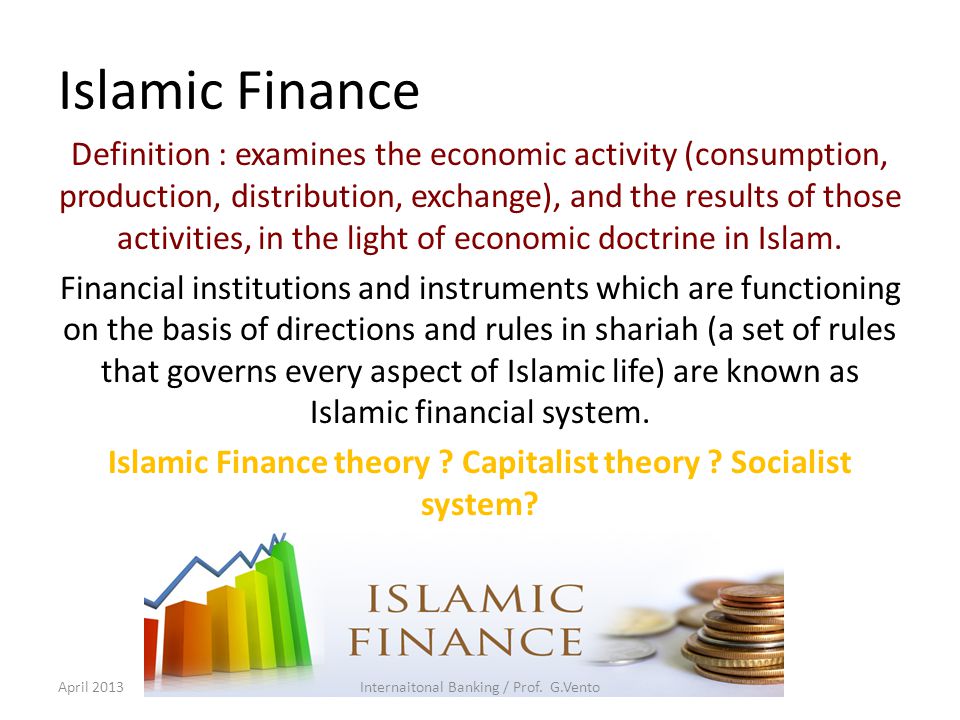Islamic Finance: What is Islamic Finance Definition
What is Islamic Finance Definition
Islamic finance is a system of financial services that is based on the principles of Islamic law, also known as Shariah. Basically It is guided by Islamic ethics, which promote fairness, transparency, impartiality and social justice. Unlike conventional finance, Islamic finance strictly prohibits the charging of interest or usury (Riba) and the involvement in activities that are considered unethical such as gambling and speculation.
The core principle of Islamic finance is the concept of risk-sharing. This means that both the provider and recipient of funds must share in the risks and rewards of any investment or business transaction. In Islamic finance, profit is generated through legitimate trade and investment activities where both parties benefit, rather than relying on interest-based lending.

Credit: slideplayer.com
Key Features of Islamic Finance
1. Prohibition Of Interest
In Islamic finance, the charging or paying of interest is strictly forbidden. Instead, financial transactions are structured based on the concept of profit and loss sharing (PLS), where returns are generated through the sharing of actual business risks.
2. Ethical Investments
Islamic finance encourages ethical investments that promote social well-being and avoid businesses that involve activities such as alcohol, gambling, or anything that is considered harmful to society. Investments in sectors such as healthcare, education, renewable energy, and technology are highly valued.
3. Asset-backed Financing
Islamic finance emphasizes the concept of asset-backed financing, where investments are backed by tangible assets or real economic activities. This ensures that financial transactions are linked to real assets and prevent speculative activities.
4. Prohibition Of Excessive Risk
Islamic finance discourages excessive risk-taking and encourages fair and just business practices. This is to ensure that the interests of both parties involved in a transaction are protected and that no one party takes unfair advantage over the other.
5. Zakat And Charitable Giving
Zakat, which is the obligatory giving of a portion of one's wealth to the less fortunate, is an integral part of Islamic finance. It promotes the redistribution of wealth and the well-being of society as a whole. Islamic financial institutions often have dedicated funds to support charitable causes.
What is Islamic Finance DefinitionIslamic Financial Instruments
Islamic financial institutions offer a variety of financial instruments that comply with Shariah principles. Some of the commonly used instruments include:
- Mudaraba: A partnership where one party provides the capital, and the other party provides the expertise to manage the investment.
- Murabaha: A cost-plus financing agreement where the seller discloses the cost and markup, allowing the buyer to make deferred payments.
- Sukuk: Islamic bonds that represent ownership in a tangible asset or business venture.
- Ijarah: Leasing agreements where the lessor owns the asset and leases it to the lessee for an agreed period and rental payment.
- Takaful: Islamic insurance based on the concept of mutual cooperation and shared responsibility.
:max_bytes(150000):strip_icc()/islamicbanking.asp-FINAL-a44177c529d24b97a0a4e857d65253cf.png)
Credit: www.investopedia.com
Benefits of Islamic Finance
Islamic finance offers several advantages compared to conventional finance:
- Enhanced ethical standards: Islamic finance promotes ethical and responsible investments, aligning financial activities with societal values.
- Risk-sharing: By promoting profit and loss sharing, Islamic finance encourages a more equitable distribution of risks and rewards.
- Stability: Islamic finance discourages excessive speculation and risky financial practices, thus contributing to a more stable financial system.
- Financial inclusivity: Islamic finance aims to provide financial services to everyone, including those who may be excluded from the conventional banking sector.
- Socially responsible investing: Islamic finance encourages investments in sectors that have a positive impact on society, such as healthcare, education, and renewable energy.
Frequently Asked Questions
What Are The Principles Of Islamic Finance?
Answer: Islamic finance follows Sharia law, with no interest and ethical investments ensuring profit sharing.
How Does Islamic Finance Differ From Traditional Finance?
Answer: Islamic finance prohibits interest, adheres to Sharia law, and promotes ethical investments.
Can Non-muslims Participate In Islamic Finance?
Answer: Yes, Islamic finance principles can be utilized by both Muslims and non-Muslims.
What Are The Key Characteristics Of Islamic Finance Products?
Answer: Islamic finance products adhere to Sharia law, focusing on profit-sharing and ethical investments.
Conclusion
So We can say that, Islamic finance is guided by principles that promote fairness, transparency, and social justice. It prohibits the charging of interest and encourages ethical investments backed by tangible assets. By embracing risk-sharing and promoting ethical financial practices, Islamic finance offers a unique alternative to conventional finance and provides a comprehensive system that addresses the financial needs of individuals and businesses while also considering societal well-being. Thanks For Reading.
Read More


.png)


.webp)

